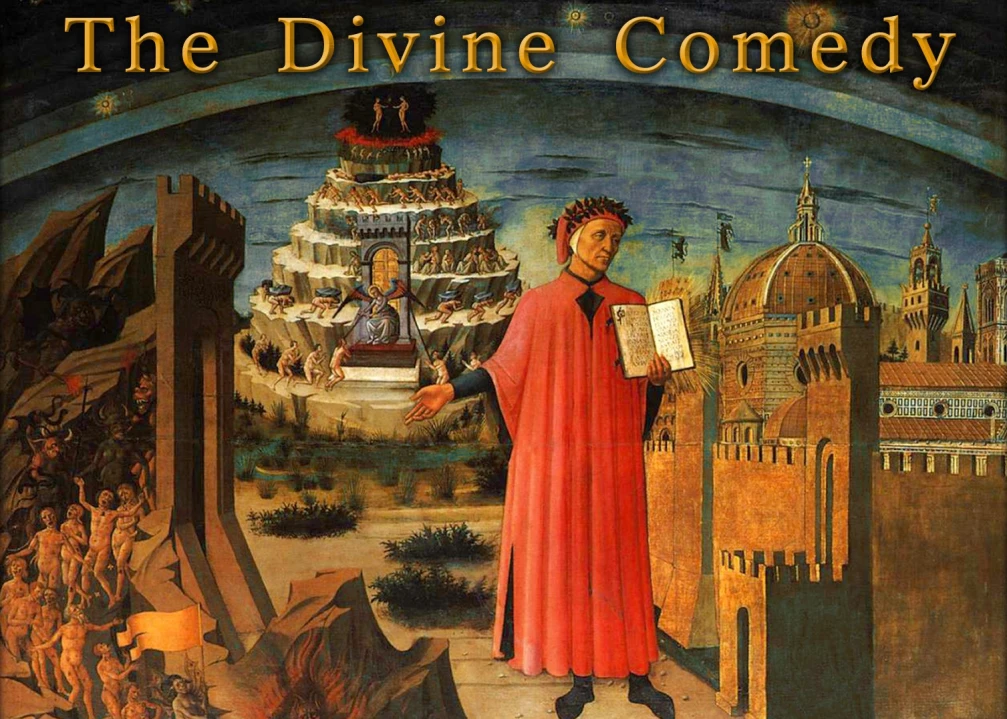This new column is born out of a personal passion, the desire to explore a new topic, the wish to present and share an important aspect of the Italian history and culture. It will focus on Italian books, both the timeless masterpieces which shaped our literature and the contemporary works that captured interest overseas.
In every article, I will try to introduce the book and its author explaining the content and the historical context; then I will delve into the importance and significance of such work in the Italian landscape; lastly, I will talk about the impact and dissemination of the piece in the United States.
For its first instalment, I would like to start with a great classic.
The Divine Comedy was written by the poet Dante Alighieri (1265-1321), and it is probably the greatest literary work in Italian history. Its content is divided into three cantica – Inferno, Purgatorio and Paradiso – and each one includes 33 cantos. The poem recounts Dante’s imaginary journey in the afterworld in 1300 during which he is accompanied first by the poet Virgilio – who represents the human reason and knowledge – and then, in the last realm by Beatrice – the woman Dante loved and who here embodies the divine wisdom and the theological dimension. This masterpiece has then an allegorical and symbolic meaning as well as the purpose to show and lead human beings towards the right and truthful path of life by exposing the punishments and rewards that awaits in the eternal life those who sin and those who are good. Dante epitomizes the man who, after losing himself to faults and sins, is finally able to recognize and regrets his mistakes and, in the end, with a now purified soul can ultimately understand faith and its truths and reach beatitude and meet with God.
Dante Alighieri’s figure seems to stand for the entire culture that was emerging starting from the XII century when “the Latin West acquired a knowledge that was unknown until then” and, thanks to all his work, he is considered as the father of the Italian language.
The Divine Comedy immediately obtained outstanding mass success, including among artisans and illiterate people, being further recited, promoted, and explained also by other prestigious Italian poets and writers. Such enormous triumph and widespread popularity were in part because Dante used the vernacular language rather than Latin and thanks to the story itself and its protagonist. The work and the way it was explicated assumed such a peculiar feature that it obtained the definition of lectura Dantis; a practice which continued with time until today when is further facilitated by means of mass communication and the Internet. As a matter of fact, nowadays, the Divine Comedy is being read and studied in schools and universities, performed in theater plays, recounted in comics, novels, and songs.
This masterpiece has therefore artistically inspired a lot of different authors and artists, both in Italy and abroad, but it also stimulated many people with some of its inspiring and famous quotes and excerpts.
In the American country, the Divine Comedy obtained significant success as well, even though it naturally came later; in fact, it has been reported that, if in 1800 almost no one in the U.S. knew who Dante Alighieri was, 50 years later “nearly every culturally aware person in the United States had not only heard of Dante but had read him and used him in creative works”.
Furthermore, the work served as a source of inspiration for many American authors as well and in 2021 the Library of Congress collaborated with the publication of a book which aimed to analyse and study Dante’s masterpiece.
The reach of Dante Alighieri’s most famous composition went beyond the sole literary world as it entered a much broader cultural and social dimension – in Italy as well as in the United States. More specifically, in 1881 the Dante Society of America was founded and – with its core “mission to encourage the study and appreciation of the time, life, works, and cultural legacy of Dante Alighieri” – it deals with publishing journals, critical notes, organizing events and sessions at schools, providing resources and material; as a matter of fact, Dante Studies (created in 1882) is the foremost journal dedicated to Dante in the English-speaking world.
The society further provides the American Dante Bibliography every year (collaborating with its Italian counterpart), a work that comprises all kinds of publications related to Dante Alighieri written by authors from North America or published in the very same region.
In my opinion the Divine Comedy is one of the world’s greatest masterpieces, whose success and diffusion go well beyond the Italian borders and whose general meaning – whether we personally want to include the religious aspect or not – transcends time and inspires human beings in their eternal quest to be and do better. As Dante said himself, fatti non foste a viver come bruti, ma per seguir virtute e canoscenza (for ye were not created to lead the life of stupid animals, but manliness and knowledge to pursue).



